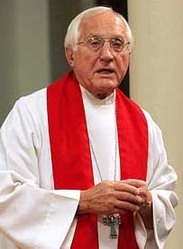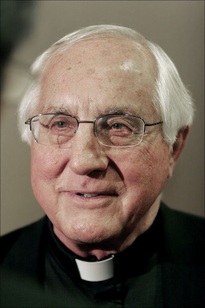Homilies
Bishop Gumbleton's homilies are posted each week on the National Catholic Reporter website.
Click here for the most current homily. An online archive of all of Bishop Gumbleton's homilies since Sept 30th, 2001, is also available from the National Catholic Reporter. Excerpts from recent homilies: Sept. 10, 2009 "Certainly, in our modern era, through our holy father, Pope John XXIII, telling us ‘in our atomic era, it is irrational any longer to think of wars as an apt means to vindicate violated rights.’ It’s irrational, it’s immoral even to think of war as a way of a Christian. Or Pope Paul VI telling us and telling the world at the United Nations, ‘War never again. No more war, never again go to war.’ We have to hear God speaking through the ministry of our church, recalling to us the most fundamental teaching of Jesus: ‘You must love not only those who love you; love your enemy. Do good to those who hurt you.’ The Jesus who rejected violence for any reason whatsoever -- we must listen to him today. Reject the human traditions, follow only the profound way of God demonstrated and taught to us through Jesus. Sept. 7, 2007 "Break down all those barriers that separate one group from another. Go out to the highways and byways, bring in the poor, the neglected, the crippled, the blind, the lame, the rejected - bring them all in. Common sense, human wisdom, would not do that. Jesus is saying to break away from that, go beyond, leap into the reign of God, where there aren't rules like that, for God is all-inclusive, all-welcoming, all-loving. Are we ready to move beyond human wisdom, to try really to live according to the reign of God, the way of Jesus? Let go of what would be common sense and be like Jesus, have a divine wisdom, a wisdom that most people think is foolish. Accept suffering rather than inflict it. Be killed rather than kill. Love to the point of laying down your life for others without condition, without limit. Are we ready to do that?" August 31st, 2007 "What if we had the openness of the vision of God? Would we be having so much trouble finding priests to serve our parishes? No. Because we would be more like God and say we can welcome married people, women to be priests, just as God shows us through Isaiah, that God welcomes, not just those that Jewish tradition said could be priests, but people from every nation regardless of their sex or their national tradition and so on. God says priests and Levites will be chosen from all. We could do the same thing in our church. What I am suggesting and hope that we will accept is that God has a vision that is vast and unlimited. Our vision is often very narrow, very constricted. We have to try to open ourselves to do, become more like God. We have to try to be more welcoming to all. We have to try to open ourselves to new ideas about who could minister in our church. We have to try to open ourselves to a new awareness of God, as father as mother, as one who loves and nurtures. As we open ourselves to all of that and grow in our own awareness of God as revealed to us in Jesus, this is what we will pass on to this infant, Justin Michael, who will become part of our community today." August 23rd, 2007 If you follow Jesus, you're going to walk into hatred, and people may want to kill you even. It's so significant, I think, that our first lesson today from this book of the prophet Jeremiah, is a lesson about God's chosen people being threatened with war and violence. Isn't there special significance in the fact that that threat was coming from Babylon, which is today the country of Iraq, where we're engaged in war? We had prophets like [Pope] John Paul II who said that war is wrong, don't do it. [Pope] Benedict [XVI] has repeated the same message. The Catholic bishops in the United States have made the same judgment, and yet like those people in Jeremiah's time, those in positions of power were determined to go forward into war, and they did. Jeremiah, because he was preaching against it - and notice the terms, because I've heard these same terms used today. "Oh, don't speak against the war. It's too hurtful to our troops who are over there." That's what they accused Jeremiah of: "You're causing a morale problem," so, "Get rid of him. Throw him into a cistern where he's going to starve to death." I've noticed too - we're already into a presidential campaign although it's over a year from the time we vote - but recently one of the candidates said, "I'll negotiate with even those that we think of as our enemies." Almost immediately the other candidate said, "No, you can't do that. You have to be strong. You've got to be ready to go to war." Why can't we hear the message of Jeremiah? He was preaching, speaking for God. Why can't we hear that message? Really it's the message of Jesus too. He rejected violence. He went to his death loving his enemies. |
Writings
Selected Writings by or about Bishop Gumbleton: Brown, Beth Dotson.“Bishop Gumbleton (interview).”In Yes! I Am Catholic: How Faith Plays a Role in My Life, 43-45. Minnesota: St. Mary's Press. 2007 Gumbleton, Thomas J. “The Role of the Peacemaker.” In War or Peace?: The Search for New Answers. USA: Orbis, 1980. ---------------. Foreward to The Deadly Connection: Nuclear War & U.S. Intervention. American Friends Service Committee. New Society, 1986. ---------------. “Failure of Moral Leadership ” In Challenge to Genocide:Let Iraq Live, ed. Ramsey Clark et al., 162-166. New York: International Action Center,1998. ---------------. “If You Want Peace, Work for Justice ” In Romero's Legacy: The Call to Peace and Justice, ed. Pilar Hogan Closkey and John P. Hogan, 35-43.Lanham, Maryland: Rowman and Littlefield, 2007. ---------------. “ ‘War...Never Again! ’...” In Spiritual Questions for the Twenty-First Century, ed. Mary Hembrow Snyder, 75-80. Maryknoll, New York: Orbis, 2001. ---------------. “ Spirituality for Peacemaking in Our Time.” Journal of Catholic Social Thought, 1 (Winter, 2004): 103-116. ---------------. “ The Church is Non-Violent” In The Many Marks of the Church, ed. William Madges and Michael Daly, 167-170. New London, Connecticut: Twenty-Third Publications, 2006. Toms, Michael. “Bishop Gumbleton: Values, Ethics, and Morals (interview).” In A Time for Choices: Deep Dialogues for Deep Democracy, 20-26. British Columbia, Canada: New Society. 2002. Wallis, James. Peacemakers, Christian Voices from the New Abolitionist Movement. Harper & Row. 1983. Weber, M., ed. Words of Peace, Vol. II: Selections from Thomas J. Gumbleton. Erie, PA: Pax Christi USA. 1991. Speeches
On war and individual responsibility:
"Citizens who unquestioningly accept the war policies of their government are untrue to their human dignity as thinking compassionate beings. Such passive acceptance is to give an almost divine status to our political leaders. The human lives at stake will not allow us to close our eyes to the moral questions raised by a war on the grounds that we do not have all the information that the government has, It is the responsibility of our political leaders to justify their war decisions to their constituents.True patriotism will inspire a citizen to seriously examine national policies that affect the lives of thousands or even millions of human beings." (from "War Never Again" New Catholic World, Sept-Oct., 1972) On nuclear weapons: "But we, they, I cannot be silent any longer. We must say no with clarity, with finality. We must say no to nuclear war. We must say no to the arms race. We must say no to the testing which makes the arms race possible." We must say yes only to authentic peace-a peace built on trust in God who sees what is in our hearts. We must say yes only to the Peace of Christ, "who though he was God, stripped himself of glory and by shedding his blood on the cross, brought peace to the world." "I cannot say yes to the peace of Christ and yes to nuclear weapons. I cannot say yes to the peace of Christ and yes to modern warfare. It doesn't fit; it is not consistent, and I cannot do it." (from Nevada Test Site Statement, May, 1987, at Pax Christi USA National action. Quoted in Words of Peace Vol. II: Selections from Bishop Thomas Gumbleton. Pax Christi USA 1991.) On the bombing of Hiroshima: "I stood before the mound in Peace Park that is the ashes of tens of thousands of unnamed people. The bodies were gathered and burned within days after the attack, and now there is only a huge mound of ashes. I stood there speechless, empty. What can you say? What can you feel in the presence of such horror, remembering how they died?" "If there is a morality that can justify such an act, then I say that there is no morality. The word is empty of significance. If there is a religious belief that can be in harmony with this, then there is no such thing as religion. If there is any way this is compatible with being a Christian, I would reject Christianity. If Jesus could bless followers who do this, I would have nothing to do with Jesus." "Clearly, there is an urgency for conversion-a complete about-face. But it has not happened. It is not happening.What concerns me most of all.is that Hiroshima, that unnamable sin, is taking place everyday. Our own nation is doing it again and again and again.Hiroshima, the sin, the evil, is committed everyday in our hearts." (From "The Challenge of Peace; The Catholic Church in Public Debate", Catholic University of America Symposium, Oct., 1989. Quoted in Words of Peace Vol. II: Selections from Bishop Thomas Gumbleton. Pax Christi USA 1991.) On dissent within the Church: ..."we must keep working against injustice wherever we find it. As you forge your own convictions, speak out responsibly. Don't you, as adults, assume the role of children within the church." (From a public discussion with University of Michigan faculty, 1980. Quoted in Words of Peace Vol. II: Selections from Bishop Thomas Gumbleton. Pax Christi USA 1991.) On sexual abuse by priests: "When every bishop in every diocese cooperates in bringing about a genuinely just resolution of every charge of sexual abuse, I believe we will once more be perceived as credible moral teachers. Thus what is good for the victims will likewise be good for the church." ..."It may cause some hardship for us financially. It might seem easier to keep the evils hidden, to move on and trust that the future will be better. But I am convinced that a settlement of every case by our court system is the only way to protect children and to heal the brokenness within the church." (From Bishop Gumbleton's testimony before the Ohio House of Representatives Judiciary Committee,January 11, 2006.)http://ncronline.org/mainpage/specialdocuments/ On the martydom of conscientious objector Franz Jaegerstaetter: "He tells us, I think, that a single act of conscience is like a seed in the ground, that whatever is done for the truth will make a difference, and that it is God that will make that difference acting through us. However small or large our acts of courage, it is God who acts through us and makes the seed grow." ( (1987, May 20). Franz Jaegerstaetter. Speech to honor the 80th birthday of Franz Jaegerstatter in Linz, Austria.) Selected full-text speeches: (1987, May 20). Franz Jaegerstaetter. Speech to honor the 80th birthday of Franz Jaegerstatter in Linz, Austria. "http://www.nationalcatholicreporter.org/peace/gumb0302.htm" |